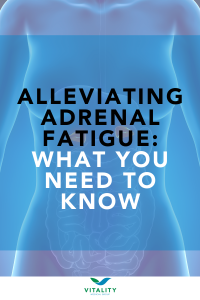
Causes
Two key hormones produced by the adrenal glands are epinephrine and norepinephrine- essentially adrenaline and an accessory hormone charged with increasing heart rate. These hormones are highly active during the sympathetic nervous system’s (SNS) response to stressors. During prolonged fight or flight situations, these hormones kick into high gear and over-produce.
Adrenal fatigue can result from chronic stress, depression, or anxiety, causing the adrenal glands to struggle to keep up with the demands of a continuous fight-or-flight response. Ultimately, this constant production of hormones burns out the body’s production mechanism, which can leave you with a weakened immune system and a continual sense of hypervigilance.
Not only does adrenal fatigue cause hormone imbalance, but a hormone imbalance can cause adrenal fatigue, creating a vicious feedback loop. The unrelated hormone imbalance may be caused by genetic factors, lifestyle changes, or underlying health issues that feed into putting excess work on the adrenal glands, which then become fatigued over time and struggle with hormone production.
Symptoms
The most common symptoms of adrenal fatigue are tiredness and body aches, unexplained weight loss, lightheadedness, and low blood pressure. However, because the adrenal glands are tasked with producing DHEA and the Androgenic Steroids (the precursors to estrogen and testosterone), men and women can experience several differing symptoms.
Testosterone regulates things such as sex drive, erectile function, and muscle development in the male body, and it's strongly impacted by cortisol, another hormone produced by the adrenal glands primarily during the flight-or-flight (SNS) response. When cortisol is released into the body, it lowers the amount of testosterone which can lead to a loss in sexual drive, erectile issues, a decrease in sperm count, and a host of other serious medical issues such as:
- Hair loss, including facial and body hair
- Increased risk of high-grade prostate cancer
- Increased risk of Alzheimer’s
- Depression
- High Cholesterol
- Low Thyroid
- Fatigue
- Weight gain
- Mood swings
- Bone loss (osteopenia)
- Decrease in bone density
- Decrease in muscle mass
Women are at a higher risk of their hormone imbalance and adrenal fatigue falling into a feedback loop that feeds off one another. The adrenal glands, thyroid, and ovaries are connected to form the ovarian-adrenal-thyroid (OAT) axis. If one part falls out of balance, it takes the others with it. So when adrenal fatigue sets in, the balance between estrogen and progesterone is skewed, and estrogen becomes dominant.
Estrogen dominance can result from adrenal fatigue, or estrogen dominance can also trigger adrenal fatigue because hormone imbalance can significantly affect the body. The main effects caused by this imbalance are fatigue, irritability, and anxiety, but may also include:
- Fluid retention and bloating
- Sore, swollen breasts
- Cysts in the breasts
- Periods stopping completely
- Irregular and missed periods
- Large clots in period blood
- Period cramps
- Endometriosis
How to Combat Adrenal Fatigue
What can you do to help re-establish homeostasis and hormone balance or avoid adrenal fatigue all together? Well, assuming it’s not the result of underlying health or genetic condition, there are a few ways to bring the body back into balance.
It’s important to keep in mind that most cases of adrenal fatigue occur during long-term, high-stress situations. So if you are currently experiencing such a situation, do your best to maintain a regular sleep schedule. Don’t worry if you’re not getting as much sleep as normal; the practice of resting can still be beneficial to your overall health. Studies show that just laying in bed, even awake, allows for your body to recover and heal.
A healthy diet can also be instrumental in avoiding or recovering from adrenal fatigue. Our stress response can often result in reaching for comfort food that doesn’t have much nutritional value compounding an already precarious situation. Having a vitamin-rich diet and sufficient water intake can ease the burden on both your adrenal glands and kidneys. Others may find they lack any appetite at all, in which case it may be time to look into vitamins and supplements as an alternative.
Support your body with consistent chiropractic care. Chiropractic adjustments help alleviate nerve interference and help nudge the body to shut down the hypervigilant SNS (fight-or-flight) response. Consistent chiropractic adjustments can keep the body in balance and support the adrenal system while other lifestyle changes bring the adrenal system back into proper function.
Functional blood chemistry analysis is one of the best ways to check the root cause of adrenal fatigue. Once the source of the adrenal stress is discovered, a proper nutritional plan along with a specific diet or meal plan can be developed. Ignoring signs of adrenal fatigue can lead to many other health-related issues. Adrenal fatigue is not typically diagnosed or understood by traditional medical methods. A doctor who is an expert in functional medicine is the best person to help you manage adrenal fatigue. Thankfully if it is caught early enough the symptoms can usually be improved without pharmaceutical drugs or invasive medical intervention.




Recent Comments